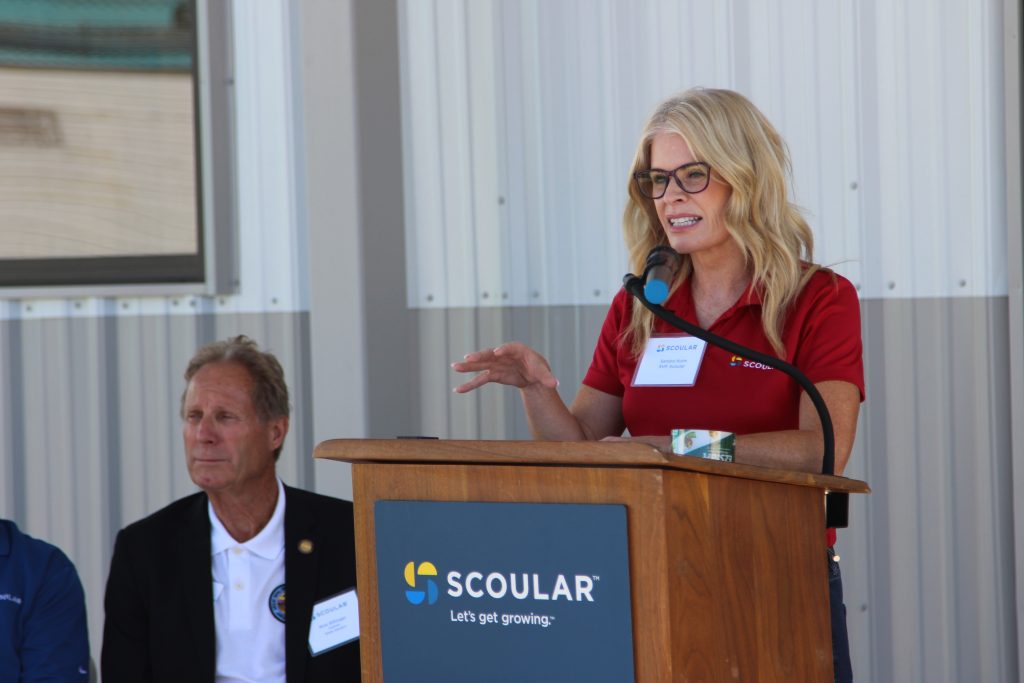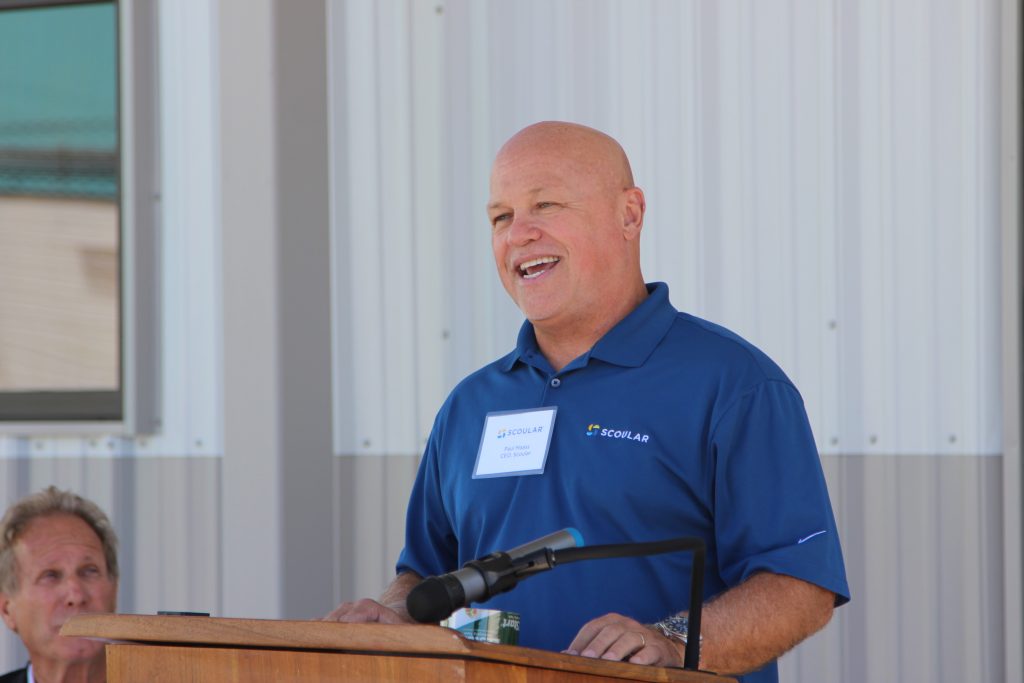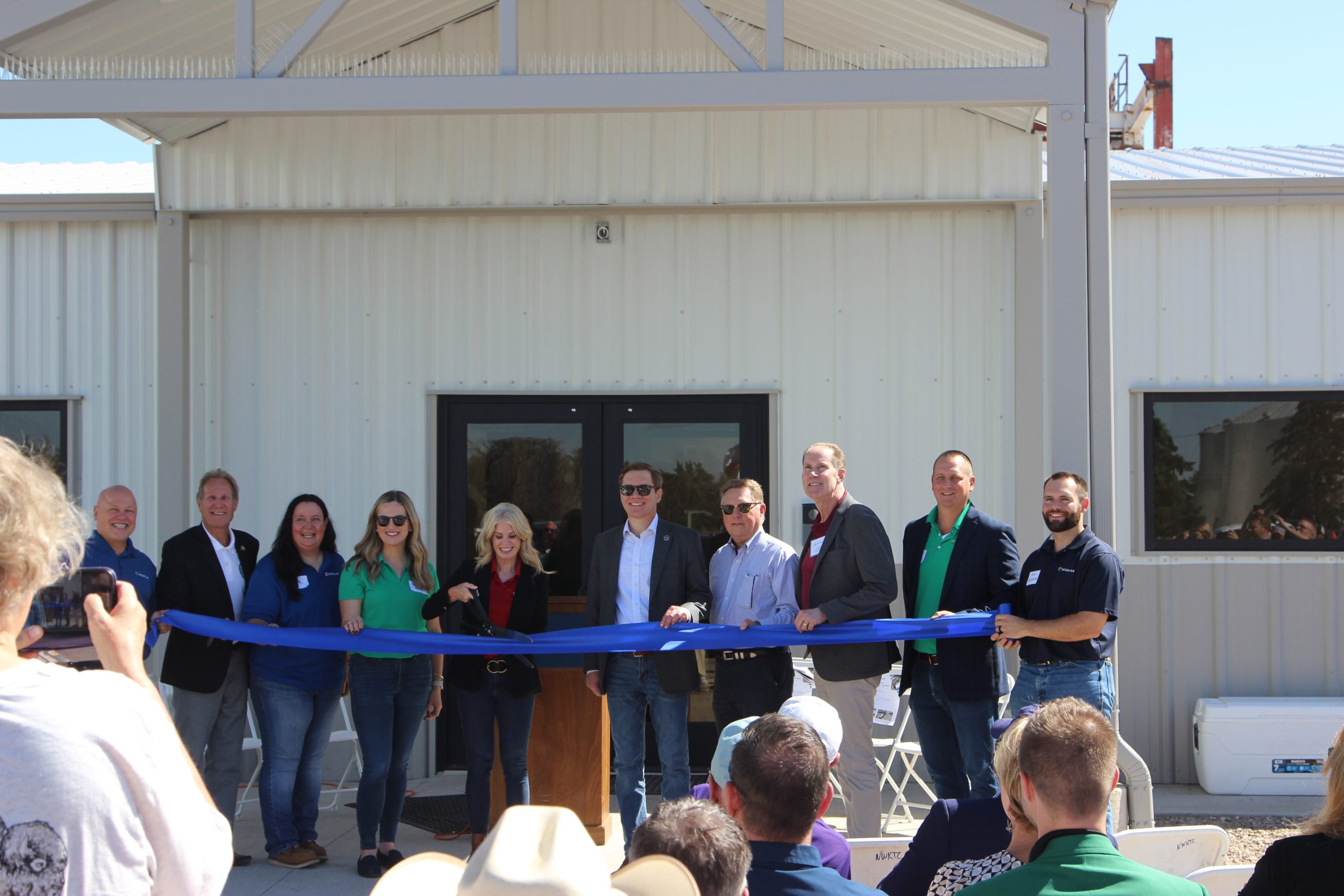A new purpose for a site where High Plains growers have found success was welcomed with open arms and many smiling faces on Sept. 18.
Scoular cut a ribbon at the Caruso plant west of Goodland, Kansas. The company has retooled the operation to handle canola and soybeans on a year-round basis. Pictured above is the ribbon cutting ceremony.
The Caruso plant was used to process sugar beets under the wing of the Great Western Sugar Company in the 1960s and 1970s. It also served as a site where sunflowers were processed.
In 2021, Scoular purchased the facility from ADM, and, in the past 1 ½ years, the company has earnestly been retooling the plant to also process both soybeans and canola—a crop familiar to High Plains growers in the Dakotas and in central parts of Kansas and Oklahoma in the southern Plains. The facility has been retrofitted to annually process 11 million bushels of oilseeds and crush 1,000 metric tons of oilseeds per day. The crush plant project has created more than 30 new jobs in the Goodland area. Scoular operates three other facilities in Goodland, too.
The plant, which sits on a nearly 150-acre site, will provide a supply of vegetable oils for low-carbon renewable diesel and sustainable aviation fuel. Also, the canola/soy meal will be supplied as feed to dairy, beef, poultry and pork producers. The facility’s capability to process canola and soybeans gives the operation versatility and long-term viability.
Sandra Hulm, senior vice president of the renewables and oilseeds division, said the Goodland plant is a success story because it shows what happens with shared vision and leadership from the local community, Sherman County, the state of Kansas, and farmers.

The project represents the commitment the company has made to the agriculture and energy sectors, she said. The company invested tens of millions of dollars to ensure safety of employees, plus it efficiently provides a quality product for the marketplace.
The Goodland operation can draw upon its elevator network in the Plains to make sure the plant will have a reliable supply of grain, she said.
“We’re here to stay,” Hulm said.
Scoular CEO Paul Maass said the project is a continuation of expansion of ethanol in the renewable fuels industry that started 20 years ago. Today, a third of the corn produced goes into renewable fuels, and that helps farmers, he said. Today’s push for lower carbon fuels has created a new demand and opportunity for a canola/soybean crush plant.

He sees canola as an opportunity for farmers in the region to grow a dryland cash crop that can work in rotation with other crops.
Scoular has the right team, as he noted Hulm’s expertise, project leaders and employees.
“We have so much confidence in how this plant operates,” Maass said.
David Faith, president and board chairman, said the board was fully behind the investment, and it is a long-term commitment. “It will be fun to see this plant light up,” he said.
Kansas Lt. Gov. David Toland commended Scoular as he said the company has invested more than $250 million in 14 Kansas counties since it started operations in the state. Scoular’s latest investment showed its statement of support for Kansas producers and communities, he said.
Kansas Secretary of Agriculture Mike Beam said building agriculture with value-added opportunities is important, and the Scoular plant is an example. The meal produced as a byproduct will be an important feed for cattle and dairy producers in the region. “The oilseed byproduct will be highly valued by animal agriculture,” he said.
State Sen. Rick Billinger said the plant is an opportunity for agricultural producers, and Scoular has invested in the state.
“Thank you for believing in agriculture in western Kansas,” Billinger said.
Toland remembered in 2020 when Billinger and Beam knew the plant facility. Toland made multiple trips with Beam and other members of the agriculture team to meet with the state senator, and that set the table for Scoular. The local community was fully committed to seeing the facility put back online.
“Community mood really matters,” Toland said, adding that spirit shows “your best days are ahead and not in the rearview mirror.”
The first truckloads of winter canola were accepted this past June. The company’s Canola MVP program has helped to increase winter canola production by 30,000 acres in one year, and set a target of 200,000 acres planted in 2025. The company has a long-term goal of working with farmers to secure 400,000 acres of canola, according to Jeff Frazier, market development manager for Scoular.
Scoular is headquartered in Omaha, Nebraska. It is an employee-owned, $8 billion agribusiness company that was established in 1892.
Dave Bergmeier can be reached at 620-227-1822 or [email protected].




